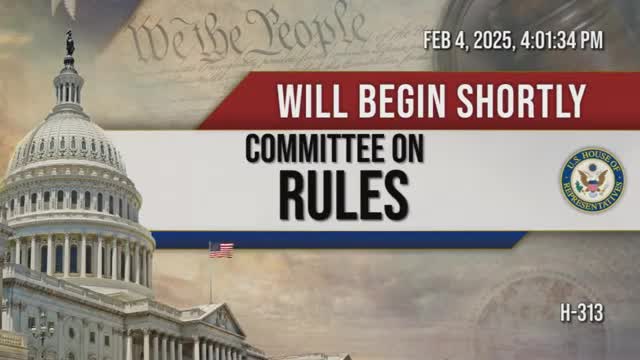House Rules Committee approves rule for HALT Fentanyl Act after debate over scheduling, research and funding freeze
Get AI-powered insights, summaries, and transcripts
Subscribe
Summary
The House Committee on Rules approved a structured rule to allow floor consideration of HR 27, the HALT All Lethal Trafficking of Fentanyl Act, after members debated permanent scheduling of fentanyl analogs, research access, mandatory minimums and recent executive actions that briefly froze federal grant payments.
The House Committee on Rules voted to report a structured rule for HR 27, the HALT All Lethal Trafficking of Fentanyl Act, clearing the bill for floor consideration after a day of debate that focused on permanently scheduling fentanyl analogs, research exemptions for scientists, mandatory minimum sentences and an administration funding freeze that members said could disrupt opioid treatment programs.
The measure reported by the committee would make the temporary Schedule I classification for fentanyl-related substances permanent, and includes language intended to streamline research access for qualified investigators. Supporters said the change would prevent traffickers from evading prosecution by slightly altering a molecule, while opponents warned the approach could increase mandatory minimum penalties and would not, by itself, expand treatment, interdiction at ports of entry, or prevention efforts.
Representative Griffith, who introduced the bill to the committee, said the legislation "will have no impact whatsoever on a physician's ability to administer fentanyl in medical settings" and that Congress should act before existing temporary scheduling orders expire. Griffith and other supporters cited a U.S. Drug Enforcement Administration figure and a 2021 Government Accountability Office finding they said showed temporary scheduling reduced the use of analogs to evade prosecution.
Representative DeGette, speaking as a witness from the Energy and Commerce Committee, urged a broader, multipronged response. "Rescheduling fentanyl as a Schedule I substance will, in and of itself, not prevent one death," she said, arguing the bill focuses on criminal penalties and class-wide scheduling by chemical structure rather than an evaluation of pharmacological effects.
Ranking Member Mr. McGovern and other Democrats pressed the majority on recent executive actions that temporarily froze or reviewed federal grant payments, including funding streams for Medicaid-related services, the Certified Community Behavioral Health Clinics demonstration, state opioid-response grants and other programs. McGovern argued those freezes undercut treatment and prevention programs that communities rely on and offered amendments to condition the bill's implementation on certification that critical behavioral health and interdiction grants remain funded; those amendments were defeated on party-line votes in committee.
Mr. Hernandez (Puerto Rico), testifying as an amendment witness, urged Caribbean-focused steps to interrupt trafficking routes and introduced two bipartisan amendments directed at Caribbean counter-narcotics strategy and a Justice Department report on fentanyl mixed with xylazine. He asked the committee to make those amendments in order; committee members did not adopt them at this hearing.
Committee action: Representative Griffith moved the committee to grant HR 27 a structured rule. The committee adopted the rule; the clerk reported the final roll call on the motion to report as 9 yeas and 1 nay. Two amendments offered by the minority — one to require Department of Homeland Security cooperation to interdict firearms trafficked to cartels and another package of amendments conditioning the bill on certification that certain opioid-related grants remain unfrozen — were defeated in recorded committee votes that the clerk recorded as 1 yea and 9 nays for each amendment.
The committee's rule waives points of order against consideration, deems the amendment printed in part A of the rules report adopted, provides one hour of general debate equally divided between the Energy and Commerce chair and ranking member or their designees, makes certain amendments in order as specified in the rules report, and provides one motion to recommit. The committee designated Representative Griffith to manage the rule for the majority and Mr. McGovern to manage it for the minority. Witnesses were excused after questions concluded and the committee adjourned.
Background and context: Supporters framed the change as a narrow fix to an enforcement gap created when traffickers modified fentanyl's molecular structure to argue that their product was not covered by existing law. Committee testimony cited an estimate that there are thousands of possible phenyl fentanyl analogs while federal research has examined only a few dozen to date, prompting supporters to keep a research exemption in the bill. Opponents warned that permanent class-wide scheduling based solely on chemical structure could raise constitutional and sentencing concerns and urged a bipartisan bill that couples enforcement with funding for prevention, treatment and interdiction at ports of entry.
What's next: With the Rules Committee's structured rule adopted, HR 27 can be considered on the House floor under the terms the committee approved. The substantive debate and any further amendments on the floor will determine whether the bill or a modified version advances to the Senate.
